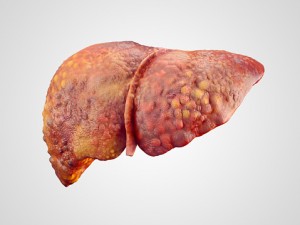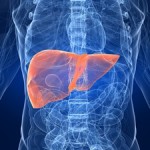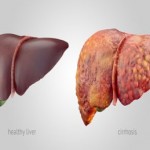Fatty liver and diabetes risks for liver fibrosis
 Non-alcoholic fatty liver disease occurs when fat accumulates in the liver. This can occur in individuals who don’t drink or who moderately drink alcohol. In some people non-alcoholic fatty liver disease causes no symptoms or complications. However, if it progresses it can ultimately lead to liver failure.
Non-alcoholic fatty liver disease occurs when fat accumulates in the liver. This can occur in individuals who don’t drink or who moderately drink alcohol. In some people non-alcoholic fatty liver disease causes no symptoms or complications. However, if it progresses it can ultimately lead to liver failure.
If you’re diabetic you should also be concerned about your liver health. Diabetes can put a person at an increased risk for non-alcoholic fatty liver disease. The Mayo Clinic reports that at least half of diabetics with type-2 diabetes will develop non-alcoholic fatty liver disease. Other contributing factors of non-alcoholic liver disease include being overweight, high cholesterol and high blood pressure.
Although diabetes may contribute to non-alcoholic fatty liver disease, the same can be reversed with the condition leading to the diagnosis of diabetes in the first place. If diabetes is poorly managed non-alcoholic fatty liver disease can worsen.
What is liver fibrosis?
Liver fibrosis occurs when scarring or damage occurs to the liver. Non-alcoholic fatty liver disease can contribute to liver fibrosis as it can lead to inflammation and scars on the liver.
In a healthy individual the liver is able to heal and repair itself. In a person with other medical conditions, or who is overweight, the liver’s ability to heal and repair diminishes, leaving permanent scarring – liver fibrosis.
Liver fibrosis can worsen to the point where the liver is unable to perform its roles. Additionally, this can lead to alternative conditions like liver failure, liver cancer and portal hypertension.
Causes of liver fibrosis can result from all chronic liver diseases, including hepatitis B and C, alcoholic liver disease and non-alcoholic liver fatty liver disease.
Liver fibrosis can be confused with cirrhosis and although they are similar, they are entirely different conditions. Cirrhosis is caused by liver fibrosis, and when liver fibrosis occurs the liver structures are still intact; after cirrhosis the liver structure becomes deformed and can begin to collapse. Reversal is possible at the liver fibrosis stage, but it is much more difficult at the cirrhosis stage.
How fatty liver and diabetes influence fibrosis
 New research has uncovered fatty liver and diabetes influence fibrosis. Furthermore, the risk for liver fibrosis increases five-fold with a fatty liver and diabetes. The findings were published in Hepatology.
New research has uncovered fatty liver and diabetes influence fibrosis. Furthermore, the risk for liver fibrosis increases five-fold with a fatty liver and diabetes. The findings were published in Hepatology.
Abdominal ultrasounds and elastography to scan the liver were performed on 3041 Dutch adults. Blood samples, anthropometric measurements, demographic data, medical histories, comorbid conditions, smoking history, drug use and alcohol consumption were all accounted for as well.
35.5 percent of participant’s had the presence of steatosis – fat in the liver cells. With each additional decade of age the risk of fibrosis increased with incidences of 1.4 percent for those between 50 and 60, 3.4 percent for those 60 to 70, 5.5 percent for those 70 to 80 years old and 9.9 percent in those 80 years and older.
The largest risks seen for fibrosis was seen in those with hepatitis B or C combined with diabetes and fatty liver.
Researcher’s note that their findings are probably quite underestimated compared to what the results would be for Americans. Dutch people are generally thinner in comparison to Americans. Estimates suggest 60 million Americans have non-alcoholic fatty liver disease.
Other liver fibrosis risk factors
Other contributing risk factors for liver fibrosis include:
- Chronic hepatitis B and C
- Gender – males are typically diagnosed with liver fibrosis more than females
- Compromised immune system
- Age – liver fibrosis is more common in those over 50
- Heavy alcohol consumption
- Steatosis – fatty liver
- Insulin resistance
Tips to prevent fatty liver
Because a fatty liver can contribute to diabetes and lead to cirrhosis and liver failure, it’s important to take the necessary steps to prevent fatty liver from occurring. Tips to prevent a fatty liver include:
- Weight loss and exercise – fat can penetrate liver cells causing a fatty liver which contributes to liver fibrosis.
- Improve diet – not only will a healthy diet help you lose weight, but the foods we eat can promote a healthy liver as well. Opt for foods that work with your liver and won’t make your liver work harder. Red meat, for example, is hard for your liver to break down so you may wish to limit your intake.
- Stick to one glass of wine – although alcohol is usually to blame for many liver conditions, sticking with one glass of wine can work to prevent a fatty liver, this according to research from the University of California – San Diego School of Medicine.
- Treat other medical conditions – diabetes, hypertension and high cholesterol which can all contribute to fatty liver.
Tips to prevent diabetes
You don’t have to be diagnosed with type-2 diabetes because it is a preventable condition. Easy lifestyle changes can put you on the right path to prevent diabetes which will also protect your liver from liver fibrosis. Tips to prevent diabetes include:
- Exercise – lose weight, lower blood sugar, boost sensitivity to insulin
- Consume fiber – improve blood sugar, lower risk of heart disease, promote weight loss
- Consume whole grains – help maintain blood sugar
- Lose extra weight – obesity also contributes to liver fibrosis
- Skip fad diets and make healthy food choices – stay away from processed foods, high-sugar foods, soda, consume more fruits and vegetables and lean meats
By managing other conditions, watching what you eat and getting in exercise, you can ensure your liver stays healthy and continues to perform its 300 different functions. Furthermore, you can lower your risk of fatty liver which can ultimately lead to liver failure.
Want a healthy liver? Avoid this…
We all know that alcohol is bad for our livers but we rarely take the opportunity to explore why. Overall, alcohol is bad for your body, but your liver gets hit first. Here’s what happens when alcohol sucker punches your liver. Continue reading…
-
The Xtreme Fat Loss Diet 25-Day Program - 7 Questions to do with This You Had Thought About But Didnt Know Where To Find Answers
Answers to the next questions will provi
-
Myths And Facts About Diet
Myth 1: Eliminating fat from your diet will help to lose weight faster
-
How Long Will One Be Out Of Work After Having Lap Band Surgery?
Many people who have weight loss surgery will do so to not only lose w
-
What Are the Top-Ten Worst Human Fears?
What Are the Top-Ten Worst Human Fears? Who cares? Inquiring Minds
-
Weight Loss Tips for Overweight Teens
This article will present teen weight lo
-
FDA Confirms That THIS Cure is Worse than the Disease
As a doctor, I have a duty to take care of my patients when the
- DON'T MISS
- How can Capsiplex Is Compared to Other Diet pills?
- Phentermine Generics Brand Names How To Avoid Prescriptions Riddled With Impurities
- Is A Weight Loss Doctor Right For You?
- What Kinds Of Foods Can Help Me Lose Weight?
- Select One Or Two Resistance Training Workouts Per Muscle Group To Target Your Whole Body
- How to Lose Weight Quickly and Keep it Off - 8 Simple Tips
- Looking for Fast Weight Loss? Think Again
- Healthy Ways to Lose Weight Fast
- Millennials Struggle More With Weight Loss Than Baby Boomers
- Top Weight Loss Tricks - The Most Successful Tips Ever




